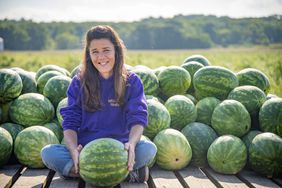:max_bytes(150000):strip_icc()/working20at20computer-c07e1baeeec3462e8e2529722615774f.jpg)
I was hosting my first virtual meeting while working from home, where I depend on WiFi for internet access. Fifteen minutes before it was to start, I logged on and for the next 20 minutes everything went smoothly. Then I got kicked out of my meeting.
I wasn't physically kicked out of an online meeting, but my internet connection started failing. Every time I logged back in, the WiFi dropped and I was back out.
Internet access has become as essential need, one that is lacking in many rural areas. According to a 2019 USDA report, 25% of U.S. farms don't have internet access, or if they do, the speed of service is significantly low. When I was an Extension agent, I can remember a farmer asking me to print information that he would drive to town and pick up. When I offered to email it, he said because of his dial-up interne, he would need to get up at 2 a.m. to download the information. This was about 10 years ago.
Last year, I attended a meeting where a farmer talked about her years as a missionary in third-world countries. When she came back to North Carolina to farm, she didn't expect internet access to be an issue, but she didn't have it at her farm.
From the cabs of tractors to the inside of livestock buildings, farmers use technology to improve efficiency and make us better stewards of the land and animals we are entrusted with.
I've seen technology used to monitor the temperature inside pig, chicken, and turkey barns, automatically lowering or raising side curtains if it's to hot or to cold. That information is sent to the farmers phones so they can constantly monitor it. We can use the same technology in our greenhouses or tobacco-curing barns.
Our tractors connect to satellites and can do a number of things, including monitoring where the sprayer has already been, cutting down on overlap of pesticides in the field. Technology gives us the tools to apply lime and fertilizer to only the areas of the field that need it, cutting down the chance of runoff.
Farmers are using technology to connect with customers like never before. Two months ago, I attended a webinar on setting up an online store. Many farmers are moving to that model and increasing their customer base in the process.
None of this is possible without internet access. It's not just business that's affected; it's also education and health. In my county, over 31% of the homes don't have internet access. That makes remote learning challenging, if not impossible, if your only internet source is the McDonald's parking lot.
Healthcare is also impacted by internet access. There aren't many doctors and specialists in rural areas. We travel an hour away for my son's specialists. In the last month, we've had two virtual doctor's visits with those specialists.
Internet access has become as essential as roads, but it's lacking in many rural areas, leaving farmers struggling to compete in an increasingly connected world.








